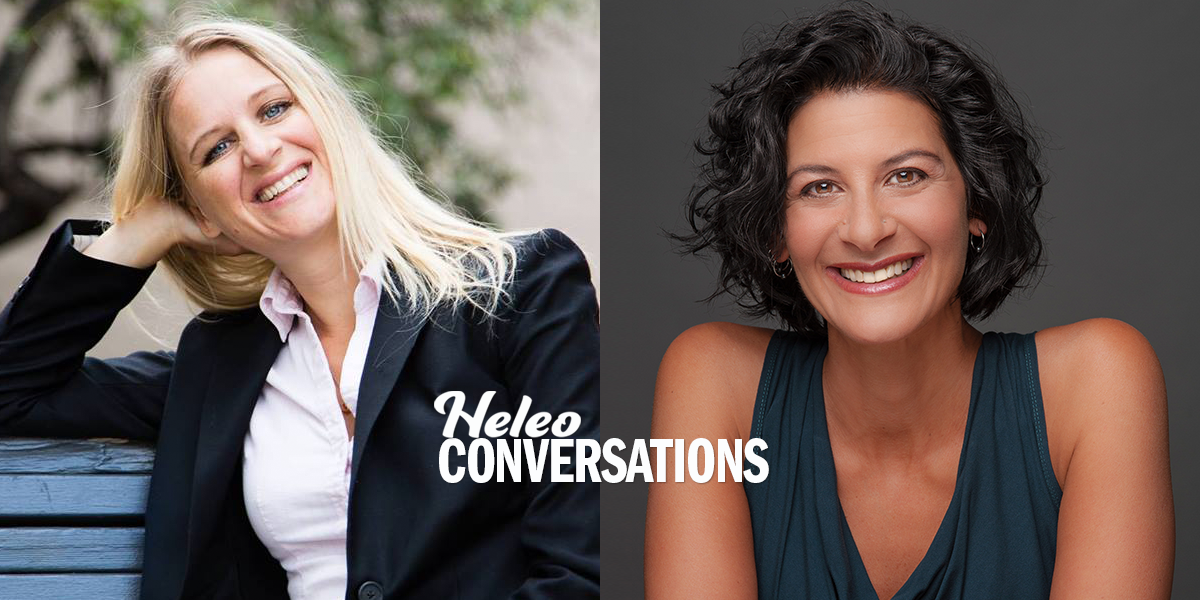What are the barriers to real happiness? Emma Seppälä, the science director at the Center for Compassion and Altruism Research and Education at Stanford University, recently joined Nancy Levin, bestselling author of Worthy: Boost Your Self-Worth to Grow Your Net-Worth, in a Heleo Conversation about the ways we can inhibit our own joy. They discuss their own paths to finding self-worth, and present strategies for being more authentic, vulnerable, and fulfilled.
Nancy Levin: I personally am very curious about this whole concept of happiness. For much of my life I related to happiness and fun and play as something that was for other people.
Emma Seppälä: Oh really?
Nancy: Yes. Happiness, fun, pleasure, play: I lumped them into an offshoot of irresponsible and lazy.
Emma: Well, there is a reason for that: American culture is very much influenced by the Protestant work ethic. Whether or not we are Protestant, it has influenced the culture, the sense that you have to prove your worth in the eyes of God. That was the original feeling, and that influenced how people approach their life. This is all based on research on cultural psychology. Countries that are Protestant, like Germany and the Nordic countries, versus the Catholic countries—France, Italy, Spain—you see a very big difference in attitude towards work as defining your life’s purpose.
The U.S. is very much influenced by the Protestant work ethic; it permeates our culture. I’m from France, where people prioritize vacation and fun much more than they do work, so when I came here I was kind of shocked to see that work defines life. Shocked at just how little value is given to happiness, pleasure, and fun. I don’t think that either extreme is ideal, but I wouldn’t blame yourself for your feeling; it’s one that many people in the United States carry, whether they know why or not.
Nancy: Oh absolutely, I see it all the time.
Emma: I think that’s the reason we are seeing 50% burnout across industries, we are seeing 75% of the American workforce disengaged. When you overdo it, you get burned out, exhausted. You lose your sense of why you are doing what you are doing. I saw it in Silicon Valley—it’s wonderful to be so achievement-oriented, the United States is incredibly creative, but on the other hand, it’s also hurting a whole society.
“What research shows leads to more of the lasting fulfillment is a sense of social connection, of purpose, of meaning.”
Nancy: It’s actually why I wrote my book, Worthy. I was someone who had put my worthiness in the hands of others, in my achievement, and in what I was producing and doing. That’s the way that I found self-value and self-worth for much of my life. It wasn’t until I could allow myself the fullness of having the joy, pleasure, and richness of life that I was able to realize the way in which I had really been putting up the barrier to my joy.
I’ve done a lot of work on this constellation of healing. When I was two years old, my six-year-old brother died, and I had a lot of survivor guilt. There was lot of “I don’t deserve to be happy, I don’t deserve to have pleasure.” So I had to work through that and to the “I’m worthy of all the joy, all the pleasure, all the happiness that is available to me.”
Trending: Best Happiness Books of 2025 (So Far)
Emma: I’m so sorry to hear about that.
Nancy: Thank you. It’s been a cornerstone of my life, and of my life’s work, as well.
Emma: People need this message. There’s a hunger because a lot of people feel their self-worth is tied to external achievements. In the same way, people feel like their happiness is tied to external things, too. Which leads to a kind of chase, but research shows if you are chasing happiness, or objects, or whatever, it can give you a short-term feeling of a high, but it doesn’t lead to lasting fulfillment. What research shows leads to more of the lasting fulfillment is a sense of social connection, of purpose, of meaning. Is that what you found?
Nancy: Definitely what I have found, and to have been able to turn my own personal experience into the foundation of my coaching, and the way that I am of service, is the most fulfilling and enriching aspect.
Emma: That’s awesome that you could find a profession that ties that all in together.
Nancy: Yeah, it’s funny, I was the event director at Hay House Publishing for 12 years, traveling around the world producing live events with all these great minds in the field of self-empowerment, inspiration, and motivation. I thought that was what I was going to do for the rest of my life. I had never in a million years thought that I would be doing what I’m doing now, and through a series of events, a very dark divorce…
During that time, I was projecting this image of perfection to the world, and managing the perceptions of others. There was a whole piece of disconnection around being impenetrable, invulnerable. A big piece of my own personal journey has been around taking off the mask, the superwoman cape, and the armor to allow myself to reveal the truth of myself, and ask for help. The people I feared revealing myself to the most were the ones who rallied around me the fiercest. Even though I had the backstage pass to all of these events I was producing, with you-name-it in that field, it wasn’t until I was in my own crisis, my own dark night of the soul, that their teachings were really able to land in me.
Emma: It takes a lot of cognitive control to always be managing what you look like. You gain a lot of your resources back when you stop.
Nancy: It takes so much energy to uphold that persona. Instantly, I found the energy and resources available to put to better use than managing others’ perceptions.
You mentioned happiness built around connection, and that is something that I found, because if I am so busy building up a wall around myself, there’s no way for there to be intimacy. Only when we are both able to be authentically revealed without fear, then we can have the true connection. That is ultimately what was able to lead me to the place of allowing in the joy, and the pleasure, and the fun because I do think we are all hiding some part of ourselves that we think we need to hide in order to be loved and accepted.
Emma: Yeah, absolutely.
“We can’t be loved for who we are if we don’t reveal who we are.”
Nancy: Then on the flipside we all are running around saying I just want to be loved for who I am, right? We can’t be loved for who we are if we don’t reveal who we are. It’s so fraught with fear and self-sabotage.
Emma: I think Brené Brown is also making beautiful points around that idea of authenticity and vulnerability. What I always find is if you allow yourself to be vulnerable, then you are giving permission to the people around you. And by letting everyone’s guard down, A: they can be themselves, and B: they are not using all that energy to try and pretend like everything is something else than it is.
Trending: Why Rest is the Biggest Productivity Hack for Your Brain
Nancy: Definitely.
Emma: It’s a very graceful and compassionate way to be in the world.
Nancy: To me it comes down to that deep truth telling with ourselves, being able to be with the truth of ourselves first, which is not always easy.
Emma: I think that’s also where practices like being in silence, meditating, being in nature, all those things that allow you to be with yourself are so important. I remember speaking to someone very dear to me who was going through a bad divorce, and I said, “Look, before you go in your next relationship, learn how to communicate.” He said, “I don’t even know how to communicate with myself.” That was such a shocking statement, and yet of course, nobody has taught you how to communicate with yourself unless you’ve been so lucky as to just naturally grow up in the countryside, and had a lot of time to spend in nature on your own. Otherwise I think maybe that’s why so many people are drawn to meditation, contemplation, and nature, so that they have those opportunities to be with their thoughts, to become intimate with their mind, their heart, their desires, their aspirations, and dreams.
Nancy: I’m curious, what are your personal practices of that nature?
Emma: I meditate twice a day, I do a Mantra meditation twice a night, and I do a breathing practice once a day. That’s probably an hour altogether, but I’m always longing for more. I feel so healed even spending a few minutes in nature. I become very centered on what I really want to do, and what really is important. I also have been listening to Vedic mantras. It’s hard to put a word on it, and I know that science has not yet figured that out, but there is an impact of sound on the soul.
Nancy: Mm-hmm. Yeah.
Emma: What about you?
Nancy: I also meditate every day. In November, I went to Chang Mai Thailand and did a 10 day Vipassana meditation retreat at a monastery. Even in all my years of Hay House and being around meditation, I had never been a practitioner. I didn’t even know that I wanted to be, it was just something that was available to me at that time, and I jumped on it. So I found myself in this monastery doing 10 days of silence, meditating morning noon and night. The most surprising thing for me was leaving the monastery, and the next day finding myself naturally wanting to meditate, and I have consistently meditated since then.
Writing is also a big piece of my way of making sense of myself and the world. I have kept a journal since I was 11 years old. And then I am very fortunate that I live in Colorado, and I can walk out my door to beautiful mountain trails, and I do that almost daily.
Emma: I realized something when I became a mom two years ago: all of a sudden you’re spending your time doing a whole lot of nothing. At the end of the day, you haven’t done anything productive, and you probably have still got dishes in the sink, and the floor is not good. At first it was so disconcerting, because you think your identity is tied into what you are doing, and most moms I’ve spoken to have gone through an identity shift and crisis.
Trending: How to Break Free From the Ambition Trap
Then over time, I started to really enjoy all those moments when he’s playing, and I’m just with him, and we’re not doing anything. They remind me of those times in retreat, between meditations when you go outside and you’re not doing anything. You don’t have your cell phone, and you are in silence, not speaking, and are not engaged in anything other than being. A child is like that, and the child is full of joy, and is full of vibrance, the presence and humor and laughter are so beautiful. I look at my child a lot and see that that is what we are. Yes, over time his mind is going to kick in, thinking about the past and future which he doesn’t think about now, and planning and dreaming, and worrying.
“But this is our nature—that spontaneous, laughing, enthusiastic, excited, present vibrance.”
But this is our nature—that spontaneous, laughing, enthusiastic, excited, present vibrance. Over time you can see that people’s faces change, and they look worn out from life. I think that practices like meditation, being in nature, they bring you back to who we are. I’ve noticed that those people who have kept that, even though they are adults, they are so childlike. My mother is in her 70s, and she is very childlike. She is not childish, she has gone through traumatic life events, but she loves life. She’s impish, she’s mischievous, and she says sometimes, “I keep forgetting I’m not 16.” It’s so beautiful that there are practices that can keep us in that vibrance.
Nancy: I don’t have children, and we joke my sister had my children for me. I had children the easiest way possible.
Emma: Maybe the best way.
Nancy: I do love being an aunt. It’s funny, now they’re 15 and 11, and I’ve obviously spent quite a bit of time with them, I find that I really have to rally my resources in a whole different way to be present to their needs. That isn’t a way that I’m used to being in my own life.
Emma: That presence is the greatest gift you can give them. It’s such a teacher, too—so often people are not fully present with us. Even if they are not on their phone, their mind isn’t there, you can tell. When someone is there it’s sometimes shocking, it’s so moving to have someone be totally attentive. By modeling that for them, who were born and raised in an age of distraction—
Nancy: Just how much distraction there is available to us, forget about old-fashioned multitasking, now it’s the phone, the devices…
Emma: Modeling that absolute presence is amazing. It can be a real gift to them, and to anyone who we encounter.
Nancy: When I was still at my job at Hay House, I was very focused on all the external forces. I was running around constantly seeking external validation, external approval. The biggest shift for me personally has been toward this place of really feeling in control of my time. No one owns my time now, I own my time, and I make choices around my own priorities, and my own non-negotiables, and I can take the time as a conscious choice to be present now.
Without the fear of the what if, or the fear of missing out on anything else that’s going on in the world. There is nothing more important than just being with what I’m being with.



























